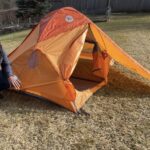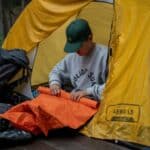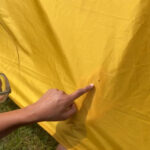One of the most annoying and irritating things about camping is getting bit by mosquitoes, flies, and other pesky bugs.
They can drive the sanest person crazy. Just a single bite can leave you feeling itchy and uncomfortable for hours. What’s even worse is getting bit by more dangerous insects and parasites such as ticks.
So, let’s explore 9 ways to prevent mosquito and bug bites while camping.
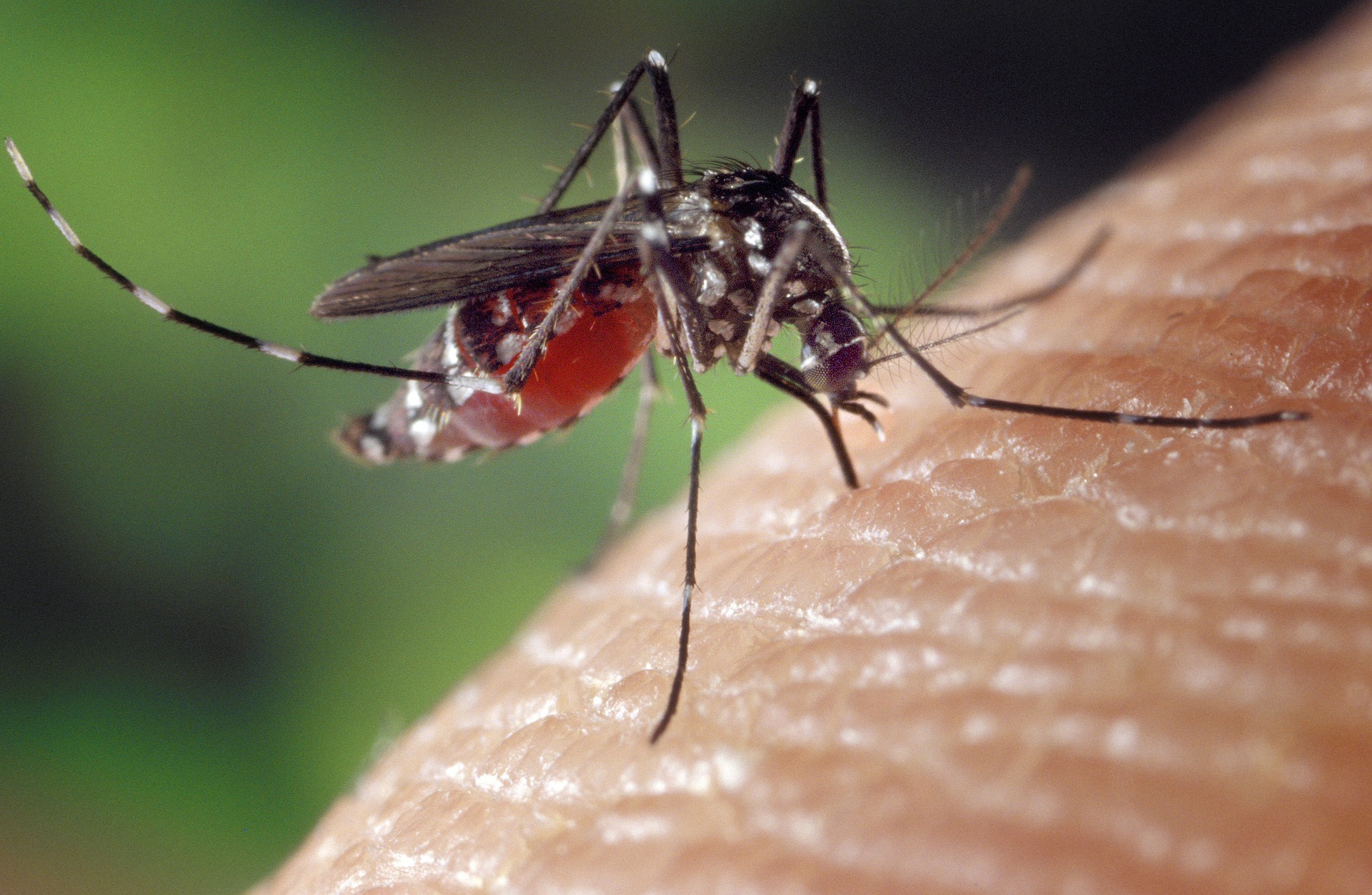
1. Don’t Camp Near Stagnant Water
Have you ever noticed that mosquitos tend to live next to water? Well, that’s because stagnant or standing water, large or small, are breeding grounds for mosquitoes.
Mosquitoes lay their eggs, known as larvae, in bodies of water. Once hatched, their offspring known as pupae live in the water until matured [Reference]. Therefore, mosquitoes have a natural tendency to occupy areas near the edges of lakes, ponds, or even temporary pools of water for breeding purposes.
So, set up your campsite far from bodies of stagnant or standing water to avoid mosquitoes. Likewise, try to prevent inadvertently creating pools of stagnant waste water from cooking or cleaning close to your site.
2. Don’t Set Up Camp Near Dense Leafy Vegetation
Mosquitos and bugs tend to live on or near leafy vegetation. Tall grass, broad-leaf trees, and dense undergrowth are habitat for a variety of insects. It provides them with shelter, protection, and sustenance.
If you happen to take a stroll off trail through some overgrown vegetation, you’ll notice a lot more insects suddenly surround you. It may not seem like that from the top, but some insects actually rest and live underneath leaves.
Harmful parasites such as ticks and leaches also live on low-laying vegetation. They can easily attach to your clothing or expose skin as it comes into contact.
By setting up your campsite far from dense leafy vegetation, you’ve essentially increased the distance between you and the resting home of hordes of insects.
Pro-tip: If you must, clear a large swath of vegetation around your site before set up. This will ensure fewer bugs and insects will bed-down next to you…
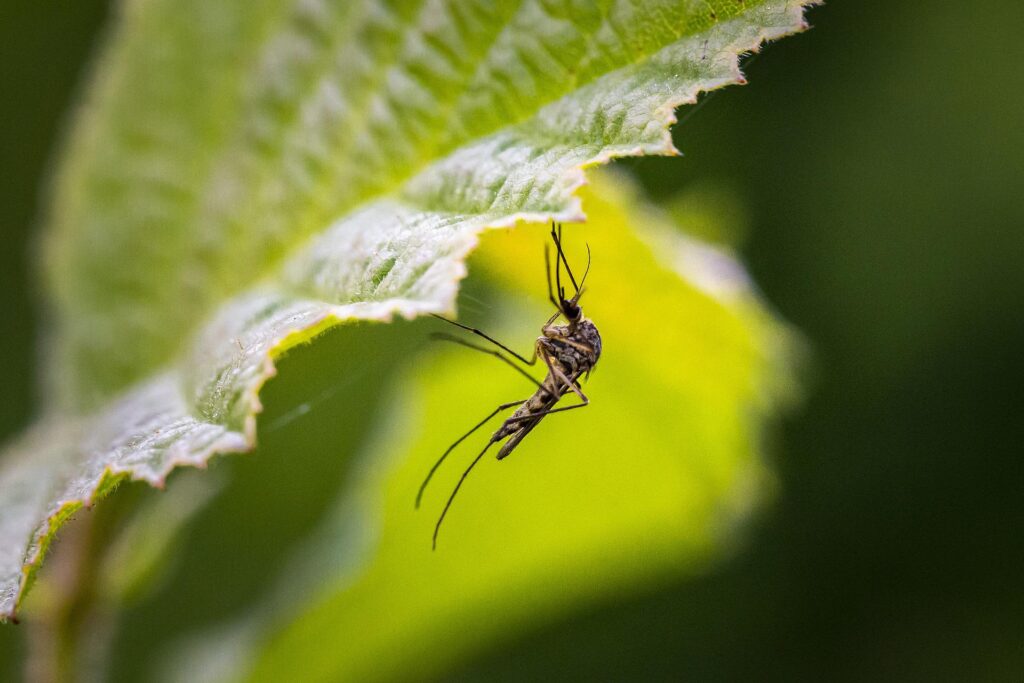
3. Plan Camping Trips AFTER Mosquito Season
Mosquitos are fairly resilient creatures. But, being cold-blooded, they are highly dependent on the ambient temperature. Temperature directly impacts their level of activity.
Unlike tropical climates where the temperature stays fairly constant and high, in temperate climates there is a distinct mosquito season.
Mosquitos require an ambient temperature above 50oF (10oF) to function [Reference]. At temperatures of 80oF (27oC) and above mosquitoes tend to thrive. Unfortunately, this temperature-activity dependency lines up perfectly with warm-weather camping season.
But, certain times of the year are worse than others:
- Late spring is considered the worst time for mosquitoes since it coincides with the end of hibernation, the hatching of larve from the previous year, and the maturing of pupae.
- Likewise, in fall, female mosquitos are eager to lay eggs which requires the consumption of animal blood [Reference].
Pro-tip: In Canada, late September and early October are the best times to camp relatively mosquito-free. And, although the weather is a bit cooler, at least the leaves are turning brilliant colors which is beautiful!

4. Stay Extra Protected or Indoors Around Dusk & Dawn
Mosquito activity peaks at certain times of the day, which coincides with sun-up and sun-down.
That’s because during much of the day, hot and intense sunlight is detrimental to mosquitoes. They tend to seek shaded and wet areas to keep cool and prevent themselves from dehydrating [Reference].
At dawn, mosquitoes are looking to feed before it starts getting too hot. Likewise, at dusk, mosquitoes are looking to feed before it gets too cold. It’s best to avoid being outdoors at these times to avoid getting swarmed.
Also, if it’s moderately warm at night, mosquitoes will remain active. So, you’ll need to protect any exposed skin and use mosquito repellent that contains DEET.
5. Apply Bug Sprays That Contain DEET
It’s generally well known that N,N-diethyl-3-methylbenzamide, also known as DEET, is by far the most effective way to prevent bites from mosquitoes, flies, ticks, and parasitic worms [Reference].
Although still relatively unclear, the primary consensus is that DEET works by either masking a host’s odor, or chemically blocking an insect’s chemical receptors upon contact [Reference].
What Concentration of DEET is Effective?
DEET-based products come in a variety of concentrations. However, the concentration of DEET is not an indication of efficacy.
The concentration of DEET is an indication of the length of time of efficacy. In other words, the higher concentration of DEET, the longer duration of protection. Using a higher concentration product just means you have to re-apply less frequently.
A product that contains 10% DEET should provide 2 hours of protection, and one that contains 24% should provide 5 hours [Reference].
After nearly a half-century of use, DEET-based products have not been linked to any detrimental side-effects if used properly, and at the proper concentration. Improper use, however, such as ingestion can lead to toxic side-effects [Reference].
Do Non-DEET Based Products Work?
Studies have found that plant-based and alternative mosquito repellents do not work as well as DEET-based repellents [Reference].
Repellents made from ethyl butylacetylaminopropionate (IR3535), picaridin, oil of eucalyptus, and soybean oil are possible alternatives, however their efficacy is limited and requires frequent re-application [Reference].
So, for prolonged protection in areas with mosquito, tick, or other parasitic insect-borne diseases, DEET-based repellents are the most effective option.
6. Cover Any Exposed Skin (Ticks Prevention)
Mosquitoes, horse flies, ticks and other parasites are naturally attracted to exposed skin since it’s an unobstructed path to human blood.
Covering up any exposed skin can reduce the amount of bites you receive, especially for insects such as horse and deer flies since they rely on cutting the skin to draw blood.
Mosquitoes can pierce through thin fabrics with their needle-like proboscis. However, thicker and bulkier layers can provide enough of a barrier to prevent bites from reaching skin.
Ticks and leaches need to contact skin directly to latch on. So, pants and long socks are always recommended when walking through low-laying, bushy areas.
What Should You Wear to Prevent Mosquito Bites?
Late spring in North America is absolutely brutal for mosquitoes. Wearing the right clothes can really make or break a camping trip planned around this time of year.
To prevent mosquitoes bites on your face, head, and neck, it’s recommended to use a loose-fitting net material. It’s breathable and provides a physical barrier so that mosquitoes can’t reach your skin.
For your body, different fabrics offer vastly different levels of protection. This article details which fabrics offer tend to protection. Denim, tight-knit wool, and nylon offer better protection from mosquito bites compared to polyester, cotton, and spandex.
For superior protection from mosquito bites, consider using clothes which have been chemically pre-treated with “permethrin”, which is an insecticide, along with using DEET directly on skin.
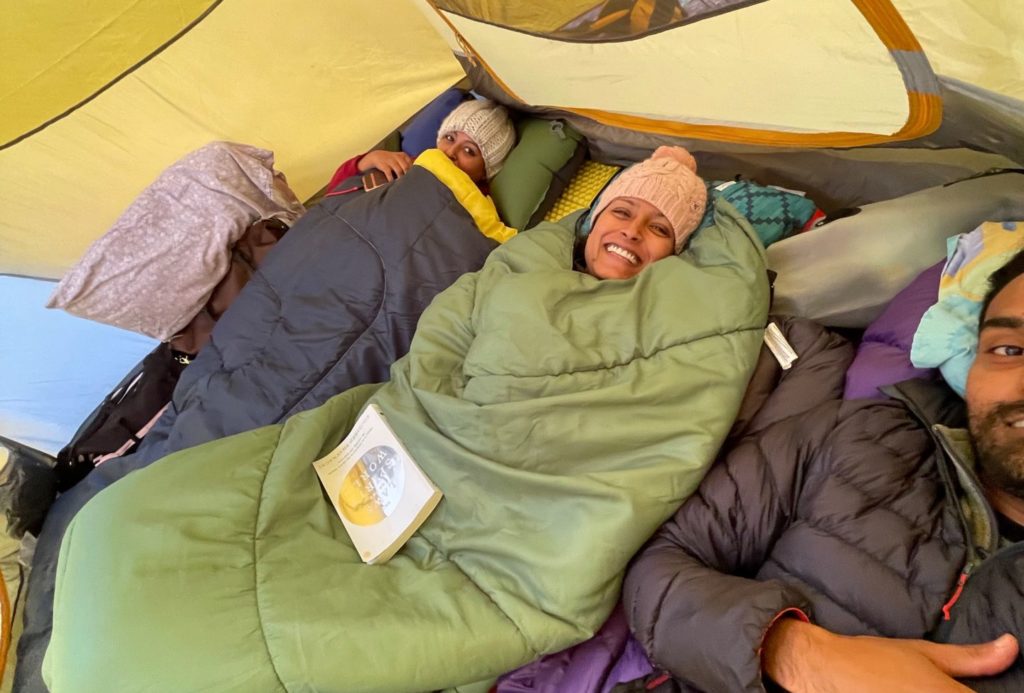
7. Keep Tent Doors Closed
A tent not only provides shelter from the elements, but it can be a safe refuge from swarms of insects.
However, a tent is an effective insect barrier only if the doors are kept closed. The heat from our bodies, and carbon dioxide generated with every exhale is a beacon for mosquitoes.
Keeping the doors open unnecessarily can allow spiders, ants, and mosquitoes to enter. And a single rouge mosquito at night can wreck havoc on your sleep.
So, instead follow these tips to prevent insects from entering your tent:
- Fully zip doors shut when entering or exiting a tent.
- Consider using tents with an internal pole that automatically closes the door.
- Shake off your clothes before entering a tent to remove any insects on your person.
- Shake the tent before entering or exiting to remove any insects on the tent fabric.
8. Use a Screen Tent
Sometimes insects get the best of us while outdoors. And, sheltering in a tent for hours upon hours until they subside can be frustrating and boring for young children.
That’s where a screen tent can be a lifesaver. A screen tent can provide a physical barrier to mosquitoes and other insects. Yet, it still allows you to enjoy more of the outdoors.
You can quickly and easily set up a screen tent over a picnic table, or a seating area. This allows you to cook, eat, and relax without having to constantly swat away bugs.
As a bonus, a screen tent also doubles as a covered area which can provide shade on hot days, and protection from rain.
Just like regular tents, there are many screen tents on the market. For simplicity, this pop-up screen tent on Amazon is large enough to fit 4 people comfortably, and waterproof!
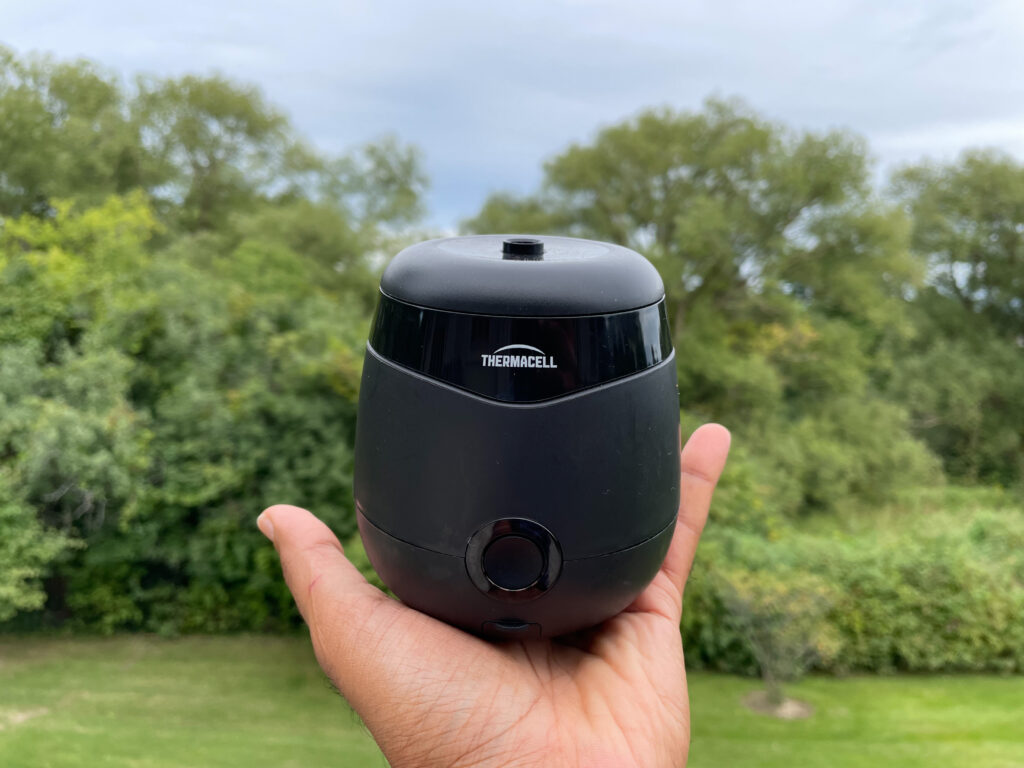
9. Consider Using a Thermacell
With all the advances in technology and science these days, you’d think there would be a device that you can just turn on and it works to automatically to keep mosquitos away.
Well, you’re in luck! Thermacell has created small, portable devices that create a zone of protection for outdoor spaces.
How Do Thermacell Devices Operate?
The technology behind Thermacell is relatively simple. A battery or fuel source provides heat to warm up a metal grill. A cartridge saturated with repellent inserted into the metal grill heats up and disperses the repellent into the air.
Does a Thermacell Actually Stop Mosquitoes?
In my experience, using the Thermacell E55 Rechargeable Mosquito Repeller while at home was effective at keeping mosquitoes away. There was a noticeable reduction in the number ofM mosquitoes immediately surrounding us.
However, on moderately windy days, the dispersed repellent would get blown away rendering it ineffective. The number of mosquitoes would not change.
From my experience and understanding, Thermacell devices are good for more protected outdoor spaces with little to no wind. However, for true backcountry camping or windier adventures, using a dedicated bug spray that contains DEET is the superior option.

This post contains affiliate links, which helps support this blog at no cost to you!
Related Posts
- Backpack Search | 30L Backpack Buyer’s GuideThere are thousands of backpacks on the market today. And, with so many models and… Read more: Backpack Search | 30L Backpack Buyer’s Guide
- How to Buy a Camping TentThe sheer number of tents on the market these days is out of control. There… Read more: How to Buy a Camping Tent
- What is Sleeping Pad R-Value? Insulation ExplainedOne of the best ways to sleep comfortably while camping during cooler conditions is by… Read more: What is Sleeping Pad R-Value? Insulation Explained
- Pros and Cons of Buying a Used Tent – Is It Actually Worth It?Whether it’s from a financial standpoint or an environmental one, buying a used tent might… Read more: Pros and Cons of Buying a Used Tent – Is It Actually Worth It?


